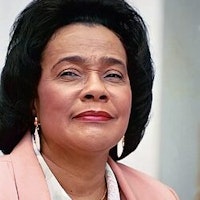To me, the Beloved Community is a realistic vision of an achievable society, one in which problems and conflict exist, but are resolved peacefully and without bitterness.
Coretta Scott King

The Beloved Community
Topic: Global Peace & Development
To me, the Beloved Community is a realistic vision of an achievable society, one in which problems and conflict exist, but are resolved peacefully and without bitterness. In the Beloved Community, caring and compassion drive political policies that support the worldwide elimination of poverty and hunger and all forms of bigotry and violence.
Coretta Scott King (née Scott) was born on April 27, 1927, in Heiberger, Alabama, United States, the third of four children to Obadiah Scott and Bernice McMurry Scott. Raised in the rural South during the Great Depression, she worked alongside her family to sustain their farm while pursuing an education her parents insisted was essential. Valedictorian of Lincoln Normal School, she attended Antioch College in Ohio on scholarship before transferring to the New England Conservatory of Music in Boston, where she earned a degree in voice and piano. It was there she met Martin Luther King Jr., and the two married on June 18, 1953. Moving to Montgomery, Alabama, she quickly found herself in the midst of the civil rights struggle, using her musical gifts in concerts that blended artistry with advocacy.
Following the assassination of her husband in 1968, Coretta Scott King assumed a visible leadership role in the ongoing fight for racial justice. She founded the Martin Luther King Jr. Center for Nonviolent Social Change in Atlanta, working to preserve his legacy and advance the principles of nonviolent activism. Her efforts were instrumental in the campaign to establish Martin Luther King Jr. Day as a U.S. federal holiday, signed into law in 1983. Beyond civil rights, she expanded her advocacy to include women’s rights, opposition to apartheid in South Africa, and support for LGBTQ rights. She maintained relationships with national leaders, including presidents and members of Congress, using her influence to address both domestic and global human rights issues.
In later years, Coretta Scott King continued to speak, write, and participate in movements for justice and peace worldwide. She was recognized with honors such as the Gandhi Peace Prize and induction into both the Alabama Women’s Hall of Fame and the National Women’s Hall of Fame. On January 30, 2006, she died in Rosarito, Baja California, Mexico, at the age of 78, from complications of ovarian cancer. She was the first African American to lie in state at the Georgia State Capitol, and she was buried beside her husband at the King Center. Throughout her life, she articulated a vision of the “Beloved Community,” where conflicts are resolved peacefully and justice forms the foundation for lasting harmony—a vision that continues to influence movements for equality today.
King, Coretta Scott. “To me, the Beloved Community is a realistic vision of an achievable society, one in which problems and conflict exist, but are resolved peacefully and without bitterness.” Facebook, post by Coretta Scott King, https://www.facebook.com/corettascottking/posts/to-me-the-beloved-community-is-a-realistic-vision-of-an-achievable-society-one-i/689076578230095/.

Coretta Scott King
Theme: Peace

About This Coretta Scott King Quotation [Commentary]
In describing the Beloved Community as “a realistic vision of an achievable society,” Coretta Scott King grounded her hope in both possibility and practicality. She did not imagine a world without disagreement or struggle; instead, she envisioned a society where problems and conflict would inevitably arise, yet be “resolved peacefully and without bitterness.” Her perspective rejects the notion that peace means the absence of challenge. Rather, peace is a disciplined commitment to reconciliation, even in the midst of tension.
King’s understanding of peace was inseparable from justice. In the full context of this statement, she identifies “caring and compassion” as the forces that should drive political policies, leading to “the worldwide elimination of poverty and hunger and all forms of bigotry and violence.” This is a vision that does not stop at interpersonal kindness but extends to systemic transformation. For King, peace is not a passive state; it is the outcome of deliberate action guided by moral responsibility and collective care.
The Beloved Community she described is both a destination and a practice. By calling it “realistic” and “achievable,” King insisted that this kind of peace is within reach if societies choose policies and personal actions rooted in compassion. Her words invite reflection on how each person might participate in building such a community—resolving conflict without bitterness, dismantling injustice, and fostering the conditions where peace is sustained not by force, but by mutual respect and shared humanity.
Additional Coretta Scott King Quotations
Resources
Related Quotes
Copyright © 2017 – 2025 LuminaryQuotes.com About Us